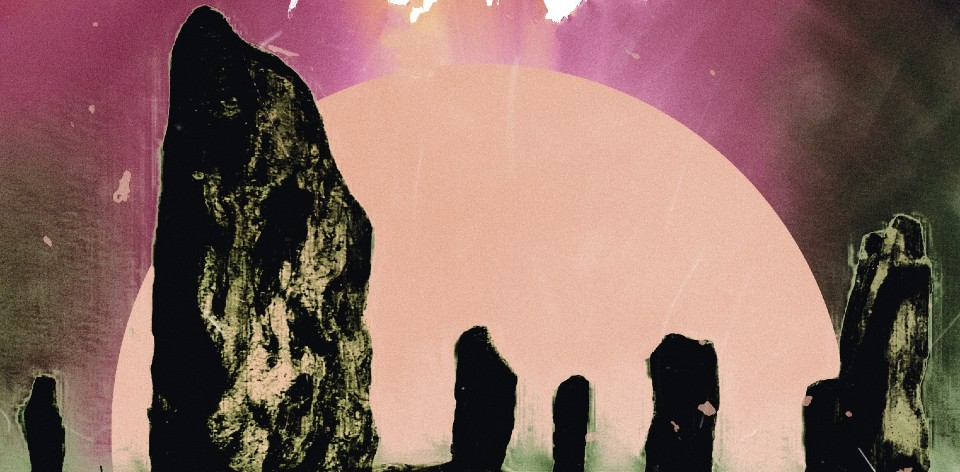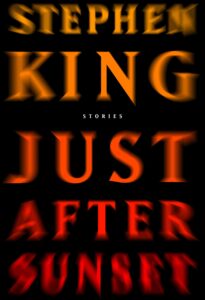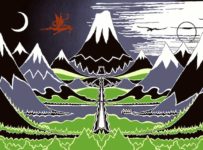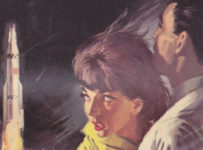Welcome back to Inconstant Reader, the feature column that explores Stephen King’s books in the order they were published — sort of! Warning: just after the setup, the SPOILERS rise.
Although this is commonly listed as Stephen King’s fifth collection of short stories, keen Constant Readers will know that’s not strictly the case. While 2008’s JUST AFTER SUNSET is the first collection since Everything’s Eventual in 2002, it’s the eight collection of King stories overall when you include novella volumes like Different Seasons and Four Past Midnight.
King’s bold declaration in Nightmares and Dreamscapes (1993) was that “all the good stories have now been collected; all the bad ones have been swept as far under a rug as I could get them.” So, while the earliest story here is from 1977 (“The Cat from Hell”) the bulk of the 12 stories (and one novella) were originally published between 2003 and 2008.
The opening salvo is “Willa,” a seemingly straight-up ghost story originally published in the pages of Playboy in 2006. It’s about a man who is unable to find his fiancée after an apparent car wreck. Winding up in a train station, it slowly becomes obvious that they have both died, and they are the only ones there who know it. The story has such an incredible sense of place from the get-go, an important element in a story where folks are trapped in a liminal space – what Buddhists might call a bardo.
Compare this with “The Things They Left Behind,” published a year earlier in the Transgressions: Volume Two compendium. Other references and allusions aside, it’s King’s most overt response to 9/11. It tells the tale of a man who didn’t go to work on that day and has collected some of the belongings of his coworkers. In both of these shorts, we see how King uses ghost stories to convey something that is as heartbreaking as it is ghostly, touching on survivor’s guilt, collective grief, and the importance of totems in the healing process.
King continues some of these themes in “The New York Times at Special Bargain Rates” (2007), in which a widow answers calls from her deceased husband. During the call, he predicts two major catastrophes. It’s almost a mirror to “Harvey’s Dream” (2003), where the titular man recounts his nocturnal adventures, culminating in the ringing of a phone that might indicate that it’s all coming true.
Another trademark is a series of stories that don’t quite go where you expect. Take “The Gingerbread Girl” about a woman who deals with the crib death of her daughter by obsessively taking up running. As we allow ourselves to let the poignancy of that sink in, King baits and switches it out for a story of abduction and survival. It’s a genuinely tense piece, and the Mexican stand-off of a conclusion is a white-knuckle ride you can’t help but read breathlessly. Likewise, the surprise in “Graduation Afternoon” (2007) is even more explosive: the titular graduation rapidly becomes about a group of people bearing witness to the end of the world.
The lengthiest of the stories is the novella, “N.” Published specifically for this collection, I got some serious H.P. Lovecraft vibes off it, although King speaks of it being “a riff on Arthur Machen’s ‘The Great God Pan,’ which is one of the best horror stories ever written. Maybe the best in the English language.” High praise indeed from the master, and while I can’t speak to the original, it certainly pulls on some eldritch traditions, playing with repeated memes, thin spaces between one world and the next, and a powerlessness to stop it all. (There’s a series of animated shorts done with Marvel that coincided with the release too).
Of course, you are always going to see familiar elements in many of the stories. Which is not to say that King is spinning his wheels, just that he knows which buttons to push – and that some terrors recur despite our best attempts to be rational about them. “The Cat from Hell” (1977), sees a hitman go after the titular feisty feline with unexpected results. “Mute” has a bit of an urban legand/Twilight Zone vibe in its ‘killer hitchhiker’ motif. “Ayana” (2007) is one of King’s first works to directly acknowledge his predilection towards the trope of ‘magical’ Black characters.
“The toilet was the American West, the Australian Outback, the Horse Head Nebula.”
If all of these stories are variations of things that scare King, a suggestion he makes in various notes to the text, then “A Very Tight Place” is the capstone. Curtis Johnson is a middle-aged gay man who Tim Grunwald lures to an empty construction lot after hours. After locking Curtis in a portaloo, much of the piece has to do with escape. It’s tense in all the right places, although Grunwald is such an insidiously vile character that one needs a shower immediately. Especially given what they both end up covered with.
King has continued to publish prolifically since this collection, with another three short fiction collections and around 17 more novels to date. Yet it’s anthologies like these that seem to showcase the diversity of his talents, while flipping that switch in our brains that craves short bursts of the macabre and a soft place to land afterwards.
Next on Inconstant Reader: Under the Dome, King’s snapshot of American history as viewed through the lens of a really big ant farm.





